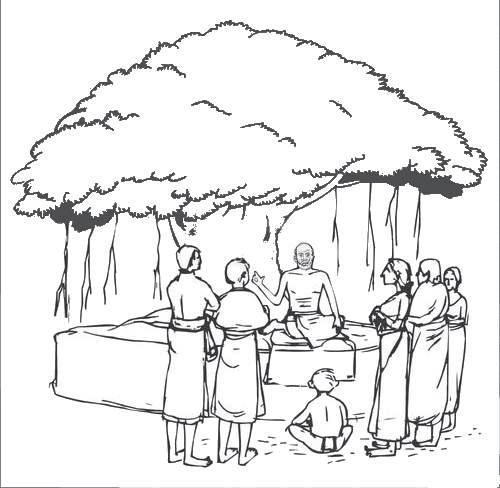
4 minute read
Pariprasna
Q & A with Srimat Swami Tapasyananda (1904 to 1991), Vice-President of the Ramakrishna Order.
Approach the wise sages, offer reverential salutations, repeatedly ask proper questions, serve them and thus know the Truth. — Bhagavad Gita
Advertisement
Question:On what does the efficacy of prayer depend? Is it not on the purity of one who prays? Maharaj: Purity may be an important factor. It is better to look upon cent per cent faith and intense longing as important factors too. It is also useful to combine prayer with austerities like fasting, observance of vows, worship etc. All these would perhaps add seriousness and concentration to the prayer. But it has to be understood that God is not exactly like an earthly father or patron in the matter of granting prayers. He is the judge of all, presiding over the Karmas of all beings. So, if our Karma is too adverse, the prayer may not be granted, as it may go against the moral law. So while it is legitimate for a devotee, who has intense faith in a Personal God, to pray to Him when he is in difficulty, he should not lose faith or take to disbelief if his prayer is not fulfilled.

Holy company Question: Scriptures inculcate that holy company (Satsanga) is necessary for the growth of one’s spiritual life. But then how is one to recognize a holy man? How are we to distinguish real holy men from spurious ones? Maharaj: It is true that holy company is the most important factor in the generation and strengthening of faith and devotion. It is also true that real holy men are very rare. The ideal of a holy man is described in the Bhagavata as follows: Wise men say that intense attachment of the mind to objects is bondage. But when such attachment is felt for holy men, it becomes an open gate to liberation. Holy men are persons endowed with equanimity in all ups and downs of life. They are full of mercy and friendliness to all. They are serene in temperament and they have no enemies. Their goodness is their ornament. They practise firm devotion characterized by the attitude of dependence on Me and Me alone. They consecrate all their actions to Me and they abandon all their relatives and clansmen for My sake.
They hear of, and discourse on, My glories and attributes, which purify those who hear them. Those who are thus devoted to Me are never troubled by the various ills of life.
Persons of the above description, who have abandoned worldly attachments, are holy men. By getting oneself attached to such persons, one overcomes attachments oneself.
It is seen from the above that a Sadhu (holy man) is one who is full of benevolence and good will to all, who is not self-centred or self-aggrandizing, who is above all attachments, who is free from all restlessness and disappointments, who practises resignation to God, who is serene and who is always engaged in thinking of or speaking of the Lord and serving Him. One can measure men with this standard of holiness given by Bhagavata and form one’s own judgement. This is an ideal and, though we come across only very imperfect examples of it in actual life, it can none the less serve us as a touchstone. But what people ordinarily do is not to accept any such scriptural standard, but to follow standards based on one’s own preconceived notions. Often miracle-working, capacity for prediction, curing of diseases, etc., are taken as criteria for holiness. The possession of such powers only shows that the persons concerned have attained psychic development. Psychic power is just like any of the worldly powers we are aware of—muscular power, financial power, intellectual power etc. Real holy men, even if they possess such powers as a side effect of their Sadhana, never use them, much less display them. It is said that though Sri Ramakrishna possessed Ashtasiddhis (eightfold powers), he eschewed them as spiritually very abhorrent, and never used them. He went about as a common man from the point of view of psychic powers, but lived the life of true holiness as depicted in the Bhagavata verses quoted above. So power-seekers never went to him, but God-seekers and devotion-seekers gathered round him, and they got what they wanted.

Self-surrender Question: What should be the attitude of one who wants to surrender oneself completely to the Lord but is frustrated and hurt by sufferings in the world? Maharaj: Sometimes it is in the grip of intense sufferings that man learns the discipline of surrender to God. So in the Gita the Bhagavan includes ‘one distressed by sufferings’ among the types of people who seek Him. There have therefore been devotees who have considered severe ailments, bereavements and tragedies of life, as their Guru; for these experiences have made them turn Godward. It is true that physical and mental distress agitates the mind and distracts it from concentration and resignation. But it must also be noted that the success and joy of achievement cause mental agitation of another kind, the effect of which on concentration and resignation is not in any way different. So all that can be said is that undeterred by all these we must earnestly engage ourselves in spiritual practice with intense longing for Him welling up in our heart. Undeterred by failures, we must constantly pray to Him to give us strength to throw ourselves entirely at His feet without depending on anything else.

Selections from Spiritual Quest: Questions & Answers by Swami Tapasyananda









